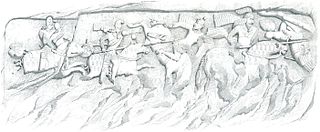The 200s decade ran from January 1, 200, to December 31, 209.
The 150s decade ran from January 1, 150, to December 31, 159.
The 160s decade ran from January 1, 160, to December 31, 169.
The 170s decade ran from January 1, 170, to December 31, 179.
The 180s decade ran from January 1, 180, to December 31, 189.
The 190s decade ran from January 1, 190, to December 31, 199.
The 270s decade ran from January 1, 270, to December 31, 279.
The 210s decade ran from January 1, 210, to December 31, 219.
The 220s decade ran from January 1, 220, to December 31, 229.
The 230s decade ran from January 1, 230, to December 31, 239.
The 240s decade ran from January 1, 240, to December 31, 249.
The 260s decade ran from January 1, 260, to December 31, 269.

Year 234 (CCXXXIV) was a common year starting on Wednesday of the Julian calendar. At the time, it was known as the Year of the Consulship of Pupienus and Sulla. The denomination 234 for this year has been used since the early medieval period, when the Anno Domini calendar era became the prevalent method in Europe for naming years.

Year 274 (CCLXXIV) was a common year starting on Thursday of the Julian calendar. At the time, it was known as the Year of the Consulship of Aurelianus and Capitolinus. The denomination 274 for this year has been used since the early medieval period, when the Anno Domini calendar era became the prevalent method in Europe for naming years.
Year 197 (CXCVII) was a common year starting on Saturday of the Julian calendar. At the time, it was known as the Year of the Consulship of Magius and Rufinus. The denomination 197 for this year has been used since the early medieval period, when the Anno Domini calendar era became the prevalent method in Europe for naming years.

Year 219 (CCXIX) was a common year starting on Friday of the Julian calendar. At the time, it was known in Rome as the Year of the Consulship of Antonius and Sacerdos. The denomination 219 for this year has been used since the early medieval period, when the Anno Domini calendar era became the prevalent method in Europe for naming years.

Year 224 (CCXXIV) was a leap year starting on Thursday of the Julian calendar. At the time, it was known as the Year of the Consulship of Iulianus and Crispinus. The denomination 224 for this year has been used since the early medieval period, when the Anno Domini calendar era became the prevalent method in Europe for naming years.
Liu Yan, courtesy name Junlang, was a Chinese politician and warlord who lived in the late Eastern Han dynasty of China. He was also a member of the extended family of the Han emperors. For most of his career he served as the governor of Yi Province, which he developed into an independent power base. His domain was passed on to his son Liu Zhang, and eventually to Liu Bei, who founded the state of Shu Han during the Three Kingdoms period.

Three Kingdoms is a 2010 Chinese television series based on the events in the late Eastern Han dynasty and the Three Kingdoms period. The plot is adapted from the 14th century historical novel Romance of the Three Kingdoms and other stories about the Three Kingdoms period. Directed by Gao Xixi, the series had a budget of over 160 million RMB and took five years of pre-production work. Shooting of the series commenced in October 2008, and it was released in China in May 2010.
Gao Pei was a military general serving under Liu Zhang, ruler of Yi Province, during the Three Kingdoms period of China.




